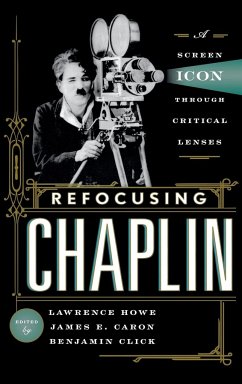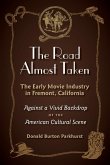Refocusing Chaplin
A Screen Icon through Critical Lenses
Herausgeber: Caron, James E.; Howe, Lawrence; Click, Benjamin
Refocusing Chaplin
A Screen Icon through Critical Lenses
Herausgeber: Caron, James E.; Howe, Lawrence; Click, Benjamin
- Gebundenes Buch
- Merkliste
- Auf die Merkliste
- Bewerten Bewerten
- Teilen
- Produkt teilen
- Produkterinnerung
- Produkterinnerung
This is a collection of scholarly essays that focuses on particular phases of Chaplin's career through various critical lenses, in order to highlight the understated, and often overlooked, complexity of Chaplin's filmmaking, and to provide insight into both the extensive range and the limits of the critical leverage of a broad array of interpretive theories.
Andere Kunden interessierten sich auch für
![Charlie Chaplin and A Woman of Paris Charlie Chaplin and A Woman of Paris]() Wes D. GehringCharlie Chaplin and A Woman of Paris64,99 €
Wes D. GehringCharlie Chaplin and A Woman of Paris64,99 €![Chaplin and American Culture Chaplin and American Culture]() Charles J. MalandChaplin and American Culture73,99 €
Charles J. MalandChaplin and American Culture73,99 €![Charlie Chaplin Charlie Chaplin]() John W. FawellCharlie Chaplin148,99 €
John W. FawellCharlie Chaplin148,99 €![Silent Vignettes (hardback) Silent Vignettes (hardback)]() Tim LussierSilent Vignettes (hardback)39,99 €
Tim LussierSilent Vignettes (hardback)39,99 €![Silent Vignettes Silent Vignettes]() Tim LussierSilent Vignettes29,99 €
Tim LussierSilent Vignettes29,99 €![The Road Almost Taken The Road Almost Taken]() Donald Burton ParkhurstThe Road Almost Taken19,99 €
Donald Burton ParkhurstThe Road Almost Taken19,99 €![Woody Allen and Charlie Chaplin Woody Allen and Charlie Chaplin]() Jill FranksWoody Allen and Charlie Chaplin52,99 €
Jill FranksWoody Allen and Charlie Chaplin52,99 €-
-
-
This is a collection of scholarly essays that focuses on particular phases of Chaplin's career through various critical lenses, in order to highlight the understated, and often overlooked, complexity of Chaplin's filmmaking, and to provide insight into both the extensive range and the limits of the critical leverage of a broad array of interpretive theories.
Hinweis: Dieser Artikel kann nur an eine deutsche Lieferadresse ausgeliefert werden.
Hinweis: Dieser Artikel kann nur an eine deutsche Lieferadresse ausgeliefert werden.
Produktdetails
- Produktdetails
- Verlag: Globe Pequot Publishing Group Inc/Bloomsbury
- Seitenzahl: 250
- Erscheinungstermin: 3. Oktober 2013
- Englisch
- Abmessung: 235mm x 157mm x 19mm
- Gewicht: 562g
- ISBN-13: 9780810892255
- ISBN-10: 0810892251
- Artikelnr.: 38127993
- Herstellerkennzeichnung
- Books on Demand GmbH
- In de Tarpen 42
- 22848 Norderstedt
- info@bod.de
- 040 53433511
- Verlag: Globe Pequot Publishing Group Inc/Bloomsbury
- Seitenzahl: 250
- Erscheinungstermin: 3. Oktober 2013
- Englisch
- Abmessung: 235mm x 157mm x 19mm
- Gewicht: 562g
- ISBN-13: 9780810892255
- ISBN-10: 0810892251
- Artikelnr.: 38127993
- Herstellerkennzeichnung
- Books on Demand GmbH
- In de Tarpen 42
- 22848 Norderstedt
- info@bod.de
- 040 53433511
Lawrence Howe is professor of English and Film Studies at Roosevelt University. He is the author of Mark Twain and the Novel: The Double-Cross of Authority (2009). James E. Caron is professor of English at the University of Hawai'i at Manoa. He is the coeditor of Sut Lovingood's Nat'ral Born Yarnspinner: Essays on George Washington Harris (1996) and author of Mark Twain, Unsanctified Newspaper Reporter (2008). Benjamin Click is Chair of the English Department at St. Mary's College of Maryland and Director of the Twain Lecture Series on American Humor Culture.
Preface: Why Refocus Chaplin? Lawrence Howe, James E. Caron, and Benjamin
Click Acknowledgements Introduction: The Persisting Appeal of Chaplin and
Charlie Charles Maland Chapter 1: Chaplin's "Charlie" as Merleau-Ponty's
Phenomenological Everyman or, How Bodily Intelligence Manifests the
Personae, Styles, and Fable of Slapstick James E. Caron Chapter 2: Chaplin
and the Static Image: A Barthesian Analysis of the Visual in My Trip Abroad
and "A Comedian Sees the World" Lisa Stein Haven Chapter 3: A Heart of
Gold: Charlie and the Dance Hall Girls Cynthia J. Miller Chapter 4:
American Masculinity and The Gendered Humor of Chaplin's Little Tramp
Lawrence Howe Chapter 5: In the Shadow of Machines: Modern Times and the
Iconography of Technology A. Bowdoin Van Riper Chapter 6: Deconstruction
and the Tramp: Marxism, Capitalism, and the Trace Randall Gann Chapter 7:
Chaplin's Presence Rachel Joseph Chapter 8: The Paradox of the "Dictactor":
Mimesis, Logic of Paradox, and the Reinstatement of Catharsis in The Great
Dictator, Monsieur Verdoux, and Limelight Marco Grosoli Chapter 9: Charles
Chaplin Sings a Silent Requiem: Chaplin's Films from 1928-1952 as Cinematic
Statement on the Transition from Silent Cinema to the Talkies Aner
Preminger Chapter 10: Chaplin's Sound Statement on Silence: The Great
Dictator as Rhetorical Encomium Benjamin Click Bibliography Index About the
Contributors About the Editors
Click Acknowledgements Introduction: The Persisting Appeal of Chaplin and
Charlie Charles Maland Chapter 1: Chaplin's "Charlie" as Merleau-Ponty's
Phenomenological Everyman or, How Bodily Intelligence Manifests the
Personae, Styles, and Fable of Slapstick James E. Caron Chapter 2: Chaplin
and the Static Image: A Barthesian Analysis of the Visual in My Trip Abroad
and "A Comedian Sees the World" Lisa Stein Haven Chapter 3: A Heart of
Gold: Charlie and the Dance Hall Girls Cynthia J. Miller Chapter 4:
American Masculinity and The Gendered Humor of Chaplin's Little Tramp
Lawrence Howe Chapter 5: In the Shadow of Machines: Modern Times and the
Iconography of Technology A. Bowdoin Van Riper Chapter 6: Deconstruction
and the Tramp: Marxism, Capitalism, and the Trace Randall Gann Chapter 7:
Chaplin's Presence Rachel Joseph Chapter 8: The Paradox of the "Dictactor":
Mimesis, Logic of Paradox, and the Reinstatement of Catharsis in The Great
Dictator, Monsieur Verdoux, and Limelight Marco Grosoli Chapter 9: Charles
Chaplin Sings a Silent Requiem: Chaplin's Films from 1928-1952 as Cinematic
Statement on the Transition from Silent Cinema to the Talkies Aner
Preminger Chapter 10: Chaplin's Sound Statement on Silence: The Great
Dictator as Rhetorical Encomium Benjamin Click Bibliography Index About the
Contributors About the Editors
Preface: Why Refocus Chaplin? Lawrence Howe, James E. Caron, and Benjamin
Click Acknowledgements Introduction: The Persisting Appeal of Chaplin and
Charlie Charles Maland Chapter 1: Chaplin's "Charlie" as Merleau-Ponty's
Phenomenological Everyman or, How Bodily Intelligence Manifests the
Personae, Styles, and Fable of Slapstick James E. Caron Chapter 2: Chaplin
and the Static Image: A Barthesian Analysis of the Visual in My Trip Abroad
and "A Comedian Sees the World" Lisa Stein Haven Chapter 3: A Heart of
Gold: Charlie and the Dance Hall Girls Cynthia J. Miller Chapter 4:
American Masculinity and The Gendered Humor of Chaplin's Little Tramp
Lawrence Howe Chapter 5: In the Shadow of Machines: Modern Times and the
Iconography of Technology A. Bowdoin Van Riper Chapter 6: Deconstruction
and the Tramp: Marxism, Capitalism, and the Trace Randall Gann Chapter 7:
Chaplin's Presence Rachel Joseph Chapter 8: The Paradox of the "Dictactor":
Mimesis, Logic of Paradox, and the Reinstatement of Catharsis in The Great
Dictator, Monsieur Verdoux, and Limelight Marco Grosoli Chapter 9: Charles
Chaplin Sings a Silent Requiem: Chaplin's Films from 1928-1952 as Cinematic
Statement on the Transition from Silent Cinema to the Talkies Aner
Preminger Chapter 10: Chaplin's Sound Statement on Silence: The Great
Dictator as Rhetorical Encomium Benjamin Click Bibliography Index About the
Contributors About the Editors
Click Acknowledgements Introduction: The Persisting Appeal of Chaplin and
Charlie Charles Maland Chapter 1: Chaplin's "Charlie" as Merleau-Ponty's
Phenomenological Everyman or, How Bodily Intelligence Manifests the
Personae, Styles, and Fable of Slapstick James E. Caron Chapter 2: Chaplin
and the Static Image: A Barthesian Analysis of the Visual in My Trip Abroad
and "A Comedian Sees the World" Lisa Stein Haven Chapter 3: A Heart of
Gold: Charlie and the Dance Hall Girls Cynthia J. Miller Chapter 4:
American Masculinity and The Gendered Humor of Chaplin's Little Tramp
Lawrence Howe Chapter 5: In the Shadow of Machines: Modern Times and the
Iconography of Technology A. Bowdoin Van Riper Chapter 6: Deconstruction
and the Tramp: Marxism, Capitalism, and the Trace Randall Gann Chapter 7:
Chaplin's Presence Rachel Joseph Chapter 8: The Paradox of the "Dictactor":
Mimesis, Logic of Paradox, and the Reinstatement of Catharsis in The Great
Dictator, Monsieur Verdoux, and Limelight Marco Grosoli Chapter 9: Charles
Chaplin Sings a Silent Requiem: Chaplin's Films from 1928-1952 as Cinematic
Statement on the Transition from Silent Cinema to the Talkies Aner
Preminger Chapter 10: Chaplin's Sound Statement on Silence: The Great
Dictator as Rhetorical Encomium Benjamin Click Bibliography Index About the
Contributors About the Editors








